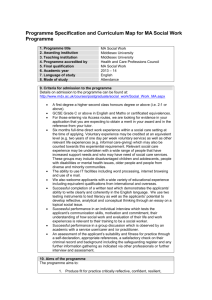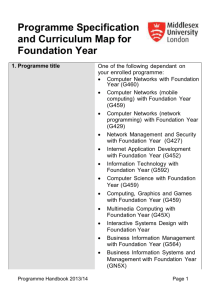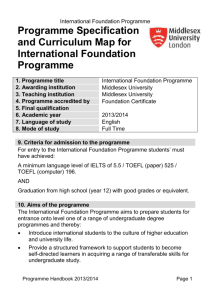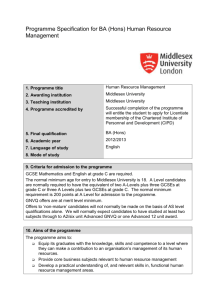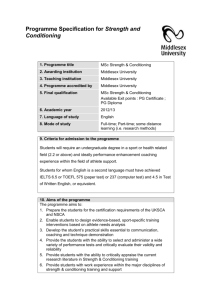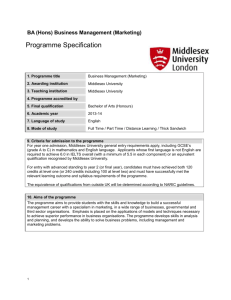Accounting and Finance - BA (Hons)
advertisement
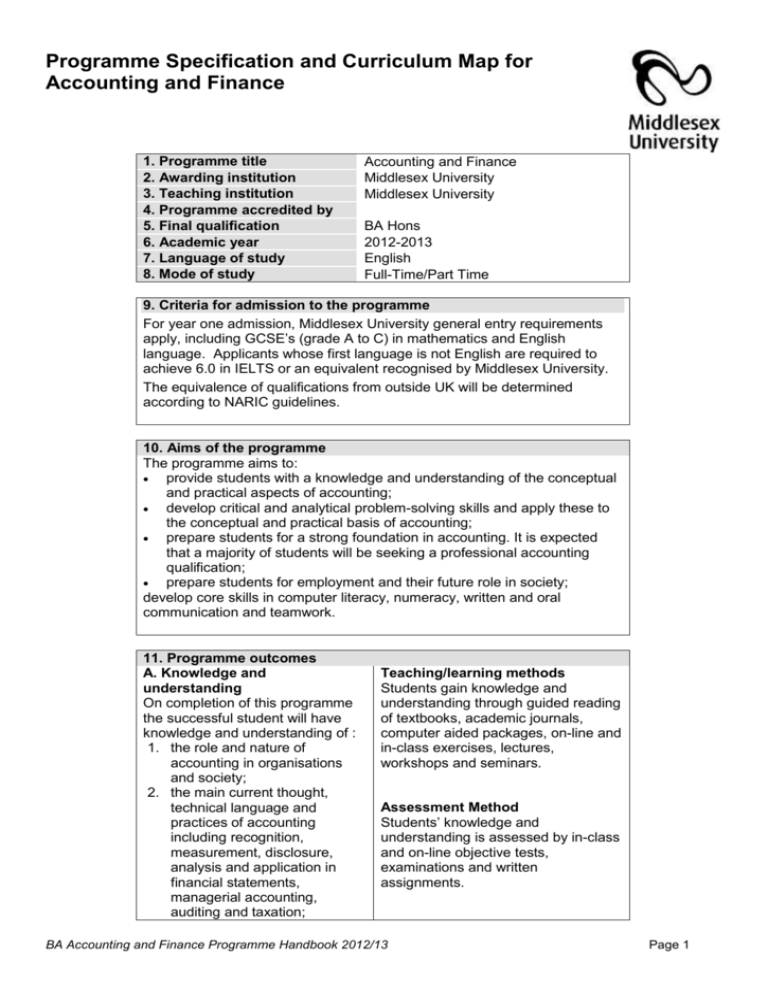
Programme Specification and Curriculum Map for Accounting and Finance 1. Programme title 2. Awarding institution 3. Teaching institution 4. Programme accredited by 5. Final qualification 6. Academic year 7. Language of study 8. Mode of study Accounting and Finance Middlesex University Middlesex University BA Hons 2012-2013 English Full-Time/Part Time 9. Criteria for admission to the programme For year one admission, Middlesex University general entry requirements apply, including GCSE’s (grade A to C) in mathematics and English language. Applicants whose first language is not English are required to achieve 6.0 in IELTS or an equivalent recognised by Middlesex University. The equivalence of qualifications from outside UK will be determined according to NARIC guidelines. 10. Aims of the programme The programme aims to: provide students with a knowledge and understanding of the conceptual and practical aspects of accounting; develop critical and analytical problem-solving skills and apply these to the conceptual and practical basis of accounting; prepare students for a strong foundation in accounting. It is expected that a majority of students will be seeking a professional accounting qualification; prepare students for employment and their future role in society; develop core skills in computer literacy, numeracy, written and oral communication and teamwork. 11. Programme outcomes A. Knowledge and understanding On completion of this programme the successful student will have knowledge and understanding of : 1. the role and nature of accounting in organisations and society; 2. the main current thought, technical language and practices of accounting including recognition, measurement, disclosure, analysis and application in financial statements, managerial accounting, auditing and taxation; Teaching/learning methods Students gain knowledge and understanding through guided reading of textbooks, academic journals, computer aided packages, on-line and in-class exercises, lectures, workshops and seminars. Assessment Method Students’ knowledge and understanding is assessed by in-class and on-line objective tests, examinations and written assignments. BA Accounting and Finance Programme Handbook 2012/13 Page 1 3. some of the alternative technical language and practices of accounting 4. theories and empirical evidence concerning financial management, risk and the operation of capital markets; 5. the operation of the English Legal system, how organisations are formed, operated and dissolved; ethical conflict and its resolution B. Cognitive (thinking) skills On completion of this programme the successful student will be able to: 1. have a capacity for critical evaluation of arguments and evidence; 2. analyse and draw reasoned conclusions concerning structured and, to a more limited extent, unstructured problems from a given set of data and data which must be acquired by the student C. Practical skills On completion of the programme the successful student will be able to: 1. prepare financial statements in accordance with international accounting standards and to analyse, interpret and evaluate financial data for the purposes of management decision making, accountability and regulation; 2. use a computerised accounting package to produce financial statements and produce cash budgets 3. interpret tax legislation and to convey its meaning; 4. retrieve, interpret, apply and manipulate costing and management accounting data and information. D. Graduate Skills On completion of this programme the successful student will be able to: 1. manipulate financial and other numerical data; 2. use communication and information technology in acquiring, analysing and Teaching/learning methods Students learn cognitive skills through individual and group exercises and case studies, tutor led seminars and class discussions. Feedback on assessments Assessment Method Students’ cognitive skills are assessed by; Essays, oral presentations and written examinations Teaching/learning methods Students learn practical skills through problem solving, workshops, computer soft wares, feedback on assignments, lectures and seminars Assessment Method Students’ practical skills are assessed by individual and group exercises, individual assignments and examinations Teaching/learning methods Students acquire graduate skills through on-line exercises, class activities, and feedback on assignments Assessment method BA Accounting and Finance Programme Handbook 2012/13 Page 2 3. 4. 5. 6. communicating information; communicate including the ability to present quantitative and qualitative information, together with analysis, arguments and commentary, in a form appropriate to the intended audience; locate, extract and analyse data from multiple sources, including acknowledgement, and referencing of sources; work in groups, and other interpersonal skills , including oral as well as written presentation skills; have capacities for independent and self managed learning. Students’ graduate skills are assessed by examinations, coursework and presentations. 12. Programme structure (levels, modules, credits and progression requirements) 12. 1 Overall structure of the programme See page page 11 The programme is studied over three years full time, or four years if the option of a 12 month placement is taken in the third year. Students study four 30 credit modules per year. There are four compulsory modules in the first year. These modules are designed to give a solid grounding in the subject and bring all students to a standard level of competence to pursue further study in the subject. The subjects studied in the first year are: Financial Accounting, Managerial Finance, Quantitative Methods for Financial Business and Economic Environment. In the second year students study three compulsory modules designed to enhance their technical capabilities in areas of Financial Accounting, Management Accounting and Law. In the second year students also have the opportunity to undertake an option from other management disciplines. These include Trade and International Business, Human Resource Management, Marketing, Financial Mathematics and Operation Management. At the end of the second year, students may opt to take a year’s placement before returning to complete their final year of study. In the final year, students will study three compulsory modules designed to advance skills and knowledge appropriate to graduate level. These are: Financial Accounting Theory, Taxation and Finance. In the third year, students have the opportunity to undertake an option module. The options available are: Auditing, Financial Performance Analysis, Corporate Accountability, Business Economics, International Marketing, Contemporary Issues in Business, Managerial Leadership, Organisational Internship, and Consulting in Organisations. The programme is divided into study units called modules and each module has a value of 30 credits. A summary outline for each module, known as BA Accounting and Finance Programme Handbook 2012/13 Page 3 Module Narrative, is provided at the end of the Programme Handbook. The academic provision of the University is based on credit accumulation. Students accumulate credit points by passing modules in order to gain the award of the University. To gain a BA degree student must gain 360 credit points, 120 of which must be at level three. 12.2 Levels and modules Starting in academic year 2010/11 the University is changing the way it references modules to state the level of study in which these are delivered. This is to comply with the national Framework for Higher Education Qualifications. This implementation will be a gradual process whilst records are updated. Therefore the old coding is bracketed below. Level 4 (1) COMPULSORY OPTIONAL PROGRESSION REQUIREMENTS Students must take all Students must pass of the following: There are no optional all four level 1 (4) modules. modules to progress ACC1110 ACC1130 ECS1240 STX1120 Level 5 (2) COMPULSORY Students must take all of the following: ACC2120 ACC2140 LAW2118 OPTIONAL Students must also choose one from the following: PROGRESSION REQUIREMENTS Students must pass all four level 2 (5) modules to progress ECS2290 HRM2013 MBS2012 MGT2110 MGT2500 MKT2222 STX2235 Level 6 (3) OPTIONAL COMPULSORY BA Accounting and Finance Programme Handbook 2012/13 PROGRESSION REQUIREMENTS Page 4 Students must take all of the following: ACC3110 ACC3130 ACC3140 Students must also choose one from the following: Students must pass all four level 3 (6) modules to gain an honours degree ACC3150 ACC3170 ACC3180 ECS3450 MBS3001 MBS3012 MGT3115 MGT3150 MGT3220 MGT3335 MKT3130 STX3335 12.3 Non-compensatable modules (note statement in 12.2 regarding FHEQ levels) Module level Module code N/A N/A 13. A curriculum map relating learning outcomes to modules See Curriculum Map on page.......44........ 14. Information about assessment regulations Middlesex University and Business School Assessment Regulations apply to this programme, without exception. 15. Placement opportunities, requirements and support A 12 month placement is offered at the end of year 2. A dedicated Employability Advisor helps in the search for an appropriate employer and provides students with appropriate Placement. It also provides students with appropriate guidance and support in preparation for during and after placement. The placement forms the basis for an assessed report based on the organisation. At the start of the placement students are allocated an individual supervisor who provides support and advice for the duration of the project. All projects are double marked. Students who complete a placement are automatically entitled to gain membership to the AAT (Association of Accounting Technicians). 16. Future This programme provides an ideal academic background for students wishing to pursue a career in accounting. The programme currently benefits from maximum exemptions from Association of Certified Chartered Accountants (ACCA) as well as many exemptions from the Chartered Institute of Management Accountants (CIMA), and from the Institute of Chartered Accountants in England and Wales and (ICAEW). The University Employability and Careers Services arrange visits to the School during the BA Accounting and Finance Programme Handbook 2012/13 Page 5 year from the accounting professional bodies of accreditation. Please refer to separate exemption booklet for further details. 17. Particular support for learning (if applicable) English Language Support Learning Resources Programme Handbook and Module Handbooks Induction and orientation programme Access to student counsellors Student e-mail and internet access 18. JACS code (or other relevant coding system) 19. Relevant QAA subject benchmark group(s) 400 Accounting 20. Reference points QAA Guidelines for programme specifications QAA Qualifications Framework Middlesex University Regulations Middlesex University Learning Framework – Programme Design Guidance, 2007 Middlesex University Business School Teaching, Learning and Assessment Strategy Benchmark Statement for Accounting Accounting Professional Bodies 21. Other information Indicators of quality: Student achievement Buoyant enrolment Student feedback evaluation forms External examiners reports Student employability Methods for evaluating and improving the quality and standards of learning are: External Examiner reports Annual Monitoring reports Board of Study Student focus group Module evaluation and report Peer teaching observations Student evaluation Validation and review panels See Middlesex university’s Learning and Quality Enhancement Handbook for further information Please note programme specifications provide a concise summary of the main features of the programme and the learning outcomes that a typical student might reasonably be expected to achieve if s/he takes full advantage of the learning opportunities that are provided. More detailed information about the programme can be found in the student programme handbook and the University Regulations. BA Accounting and Finance Programme Handbook 2012/13 Page 6 Curriculum map for BA Accounting and Finance This section shows the highest level at which programme outcomes are to be achieved by all graduates, and maps programme learning outcomes against the modules in which they are assessed. Programme learning outcomes Knowledge and understanding Practical skills A1 Role and nature of accounting in organisations and society C1 Prepare financial statements in accordance with international accounting standards and to analyse, interpret and evaluate financial data for the purposes of management decision making, accountability and regulation. A2 Current thought, technical language and practices of accounting including, recognition, measurement, disclosure, analysis and application in financial statements, managerial accounting, auditing and taxation. C2 Use a computerised accounting package to produce financial statements and produce cash budgets A3 Some of the alternative technical language and practices of accounting C3 Compute tax liabilities and interpret tax legislation and to convey its meaning A4 Theories and empirical evidence concerning financial management, risk and the operation of capital markets. C4 Retrieve, interpret, apply and manipulate costing and management accounting data and information A5 The operation of the English Legal system, how organisations are formed, operated and dissolved A6 Ethical conflict and its resolution Cognitive skills Graduate Skills B1 Capacity for critical evaluation of arguments and evidence D1 Manipulate financial and other numerical data B2 Analyse and draw reasoned conclusions concerning structured and, to a more limited extent, unstructured problems from a given set of data and data which must be acquired by the student D2 Use communication and information technology in acquiring, analysing and communicating information D3 Communicate including the ability to present quantitative and qualitative information, together with analysis, arguments and commentary, in a form appropriate to the intended audience Graduate Skills D4 Locate, extract and analyse data from multiple sources, including acknowledgement, and referencing of sources D5 BA Accounting and Finance Programme Handbook 2012/13 Work in groups, and other interpersonal skills , including oral as well as written presentation skills Page 7 D6 BA Accounting and Finance Programme Handbook 2012/13 Have capacities for independent and self managed learning Page 8 Curriculum map This section shows the highest level at which programme outcomes are to be achieved by all graduates, and maps programme learning outcomes against the modules in which they are assessed. Programme outcomes A1 A2 A3 A4 A5 A6 B1 B2 C1 C2 C3 C4 C5 D1 D2 D3 D4 D5 D6 Highest level achieved by all graduates 3 3 3 3 2 Module Title 3 3 Module Code Level 4 (Year One) 3 2 3 3 2 3 3 3 3 3 3 Programme Outcomes A1 A2 A3 A4 A5 A6 B1 B2 C1 C2 C3 C4 D1 D2 D3 D4 D5 D6 Financial Accounting ACC1110 Managerial Finance ACC1130 Economic Environment ECS1240 Quantitative Methods for Financial Business STX1120 Level 5 (Year Two) 3 Advanced Financial Accounting ACC2120 Management Accounting ACC2140 Trade and International Business ECS2290 Human resource Management HRM2013 Law for Accountants LAW2118 Consulting to Organisations MBS2012 Operations Management MGT2110 Business Environment MGT2500 Principles of Marketing MKT2222 Financial Mathematics STX2235 BA Accounting and Finance Programme Handbook 2012/13 Page 9 Module Title Module Code Programme Outcomes A1 A2A3A4A5A6B1B2C1C2C3C4D1D2D3D4D5D6 Level 6 (Year Three) Financial Accounting Theory ACC3110 Finance ACC3130 Taxation ACC3140 Financial Performance Analysis ACC3150 Corporate Accountability ACC3170 Auditing ACC3180 Business Economics ECS3450 Organisational Internship MBS3001 Consulting in Organisations MBS3012 Contemporary Issues in Business MGT3115 Managerial Leadership MGT3150 International Operations Management MGT3220 Supply Chain Management MGT3335 International Marketing MKT3130 Financial Statistics STX3335 BA Accounting and Finance Programme Handbook 2012/13 Page 10
